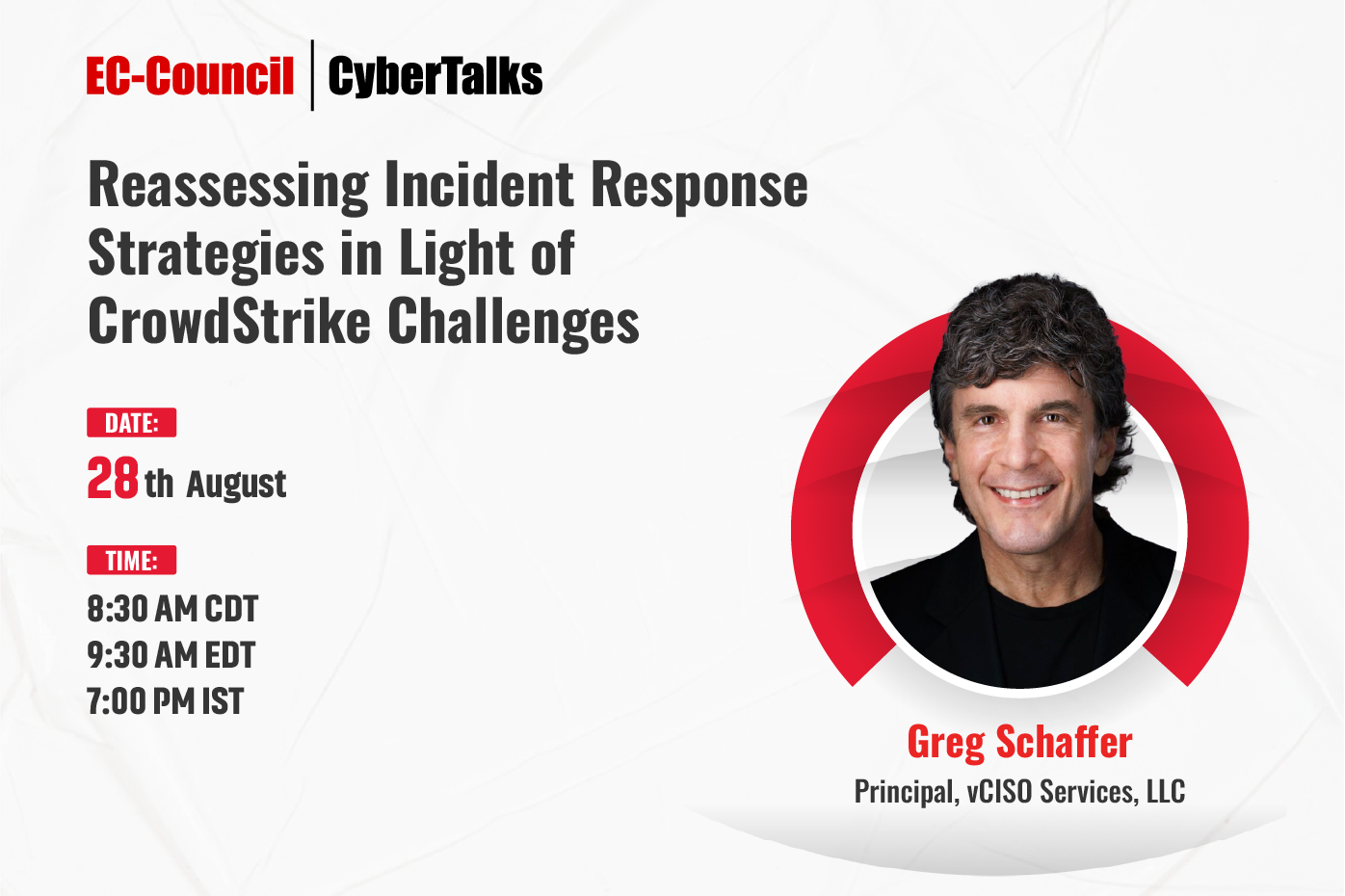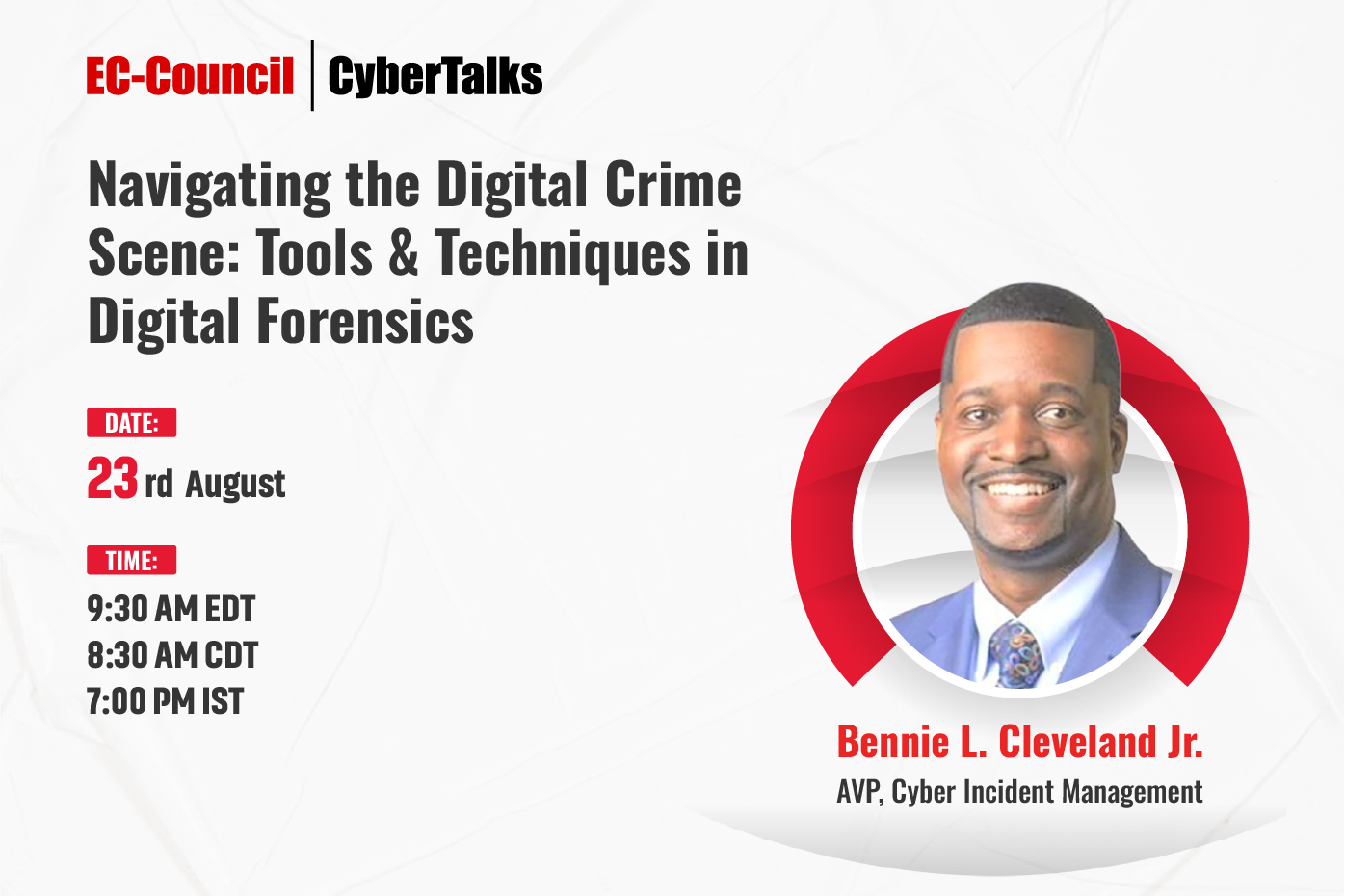In the current threat landscape, where cyber threats are rapidly evolving and increasing, organizations need to employ advanced security protocols, such as ethical hacking and pen testing, that aim to proactively identify and rectify vulnerabilities within systems, networks, and applications. With the advancement of technology, the importance of ethical hacking has become increasingly critical to protect sensitive information from malicious actors. Ethical hackers utilize their skills to simulate a cyberattack, enabling organizations to identify the gaps and fortify their defenses accordingly. In this ongoing effort, ethical hacking programs such as C|EH play a vital role in equipping cybersecurity aspirants with much-needed technical skills to contribute towards building a resilient cybersecurity posture for organizations.
Toward understanding the practical implementation of C|EH in disseminating relevant skills to ethical hackers across the globe, we interviewed Andreas Constantinides, Director at Odyssey Cybersecurity, who has over 20 years of industry experience in the fields of information security, security design, threat analysis, incident response, and network security. He has experience managing SOC and Managed Security Services (MSS) capabilities for over a decade and currently serves as the Director of Managed Services, delivering top-tier security solutions.
Can you share a brief overview of your professional background and experience?
I have always been a curious individual, perpetually intrigued by the inner workings of things. My journey began in my teenage years when I delved into independent research, identifying and reporting bugs, crafting simple exploits, and even contributing articles about cybersecurity news to a local computer magazine.
Transitioning into the corporate world, I embarked on my path as a security engineer. I spearheaded the implementation of diverse technologies, designed secure network architectures, and actively participated in pivotal tasks such as penetration testing and vulnerability assessments.
I was also involved in designing and implementing a security operations center (SOC) with a small team of engineers. Through dedicated effort, we nurtured it into a fully-fledged 24/7 operation, and I proudly served as its manager for an extensive period.
Today, I lead the Managed Services, offering SOC and Professional Services with an expansive array of security solutions centered around Odyssey’s ClearSkies Threat Detection, Investigation & Response platform. Beyond my profound technical background, I also engage in Government, Compliance, and Risk-related activities, providing various consultancy services. Holding the esteemed position of a QSA auditor for PCI-DSS, the credit card security standard, I’ve amassed a portfolio of certifications, including the C|EH certification.
What role did the C|EH play in advancing your career?
I’ve always been fascinated with hacking activities and experimenting with networks and software. Within the professional world, these activities were formally labeled as “pen testing” to align with acceptable practices. After a decade of immersing myself in this realm, I decided to pursue a certification. This choice was motivated by two primary factors: firstly, to validate my existing knowledge, and secondly, to address any potential gaps that might have eluded my awareness.
I opted for the C|EH (Certified Ethical Hacker) credential. The C|EH program effectively achieves what I sought. It aids in the identification of weak points in my knowledge, bridges knowledge gaps, and rigorously evaluates one’s expertise.
Attaining the C|EH certification is relatively easy for those well-versed in security assessment. Nevertheless, it holds significant value even for seasoned professionals, as it facilitated my deeper comprehension of weak points, enhanced my understanding of concepts, and provided a means of self-assessment.
Furthermore, the C|EH is an excellent entry point for individuals embarking on their journey in ethical hacking. Its practical components offer a more comprehensive exploration, delving further into the subject matter.
In what ways has the Certified Ethical Hacker (C|EH) certification enabled you to contribute to the cybersecurity community?
Beyond simply claiming experience and substantiating it through the execution of numerous projects and delivering services within the corporate sphere, the C|EH certification bestowed upon me a newfound assurance. This confidence propelled me to embark on personal ventures, including creating a multitude of practice questions designed to evaluate proficiency in security and ethical hacking.
In addition, I am delighted to unveil my recently published book aimed at aiding fledgling cybersecurity engineers in grasping the fundamental principles of cybersecurity. The book titled “Cybersecurity 101: Fundamentals for Junior Engineers and Job Seekers,” is available through Amazon in paperback and Kindle formats.
Moreover, a notable endeavor deserving of mention involves a pro-bono assignment I undertook with great enthusiasm. I had the privilege of designing and delivering a course for children aged 8 to 11, focusing on educating them about online threats, ensuring their safety in the digital realm, addressing online bullying, emphasizing password security, threats in online gaming, and more. This task presented considerable challenges as I needed to adapt my communication style to effectively engage with young minds, crafting narratives that translated complex cybersecurity concepts into an easily digestible format for kids. The course incorporated diverse stories and interactive games. Additionally, I created a custom snake and ladder game that incorporated cybersecurity threats and best practices, allowing the kids to engage in a practical and enjoyable learning experience beyond the classroom. The successful execution of this initiative brings me immense satisfaction and pride.
Exploring the Practical Applications of Key Modules in the C|EH Program:
The Certified Ethical Hacker (C|EH) program provides a holistic security perspective on securing networks, with each separate module designed to equip individuals with practical skills and knowledge in various aspects of ethical hacking and cybersecurity. Below, I provide some of these modules and their practical uses.
The Introduction to Ethical Hacking serves as the foundation, as it introduces principles, methodologies, and legal considerations of ethical hacking. Its practical use is to understand the ethical hacking landscape and set the context for the subsequent modules.
In Footprinting and Reconnaissance, you delve into getting information about a target system or network using various tools and techniques. Following the Footprinting, you then get into scanning networks, where you learn to discover active hosts, open ports, and services on a network. Its practical use is to identify potential entry points and weaknesses in a target network.
During Vulnerability Analysis, you learn to assess the vulnerabilities of target systems and applications. You will be able to identify weak points that could be exploited by malicious actors and propose remediation strategies. In System Hacking, you will explore methods to compromise target systems, including password cracking and privilege escalation. Its practical use is simulating real-world attacks to understand how adversaries gain unauthorized access. In Sniffing, you will learn about network traffic interception, analysis, and countermeasures. You will identify sensitive data leaks and how to secure network communication.
Social Engineering is one of my favorites because humans are always the weakest link. This module covers psychological manipulation techniques attackers use to exploit human behavior. You then learn how to raise awareness about social engineering tactics and implement safeguards against them.
In Hacking Web Applications and SQL Injection, you learn about exploiting vulnerabilities in web applications and databases. You learn how these attacks work, how to exploit vulnerabilities, and methods to mitigate them.
These are just some of the components of the C|EH. The complete list provides practical skills for ethical hacking, penetration testing, and strengthening cybersecurity defenses. The knowledge gained enables professionals to identify and mitigate vulnerabilities, ensuring the security of systems and networks, among other skills.
How does C|EH contribute to teaching and skill-building the core and fundamental skills needed for any cybersecurity professional?
The C|EH program plays a crucial role in acquiring and developing the core skills required for any cybersecurity professional. It achieves this by offering hands-on training that simulates real-world scenarios, enabling participants to gain practical experience in identifying vulnerabilities, exploiting weaknesses, and implementing security measures to mitigate risks.
One of the key benefits of the C|EH program is its focus on delving into the mindset and tactics of malicious hackers. This provides cybersecurity professionals with valuable insights into the methods employed by attackers, enabling them to design robust defense strategies and stay ahead of emerging threats. The program also covers vulnerability assessment and penetration testing (VAPT) domains. In this, you will learn how to conduct ethical assessments of vulnerabilities and perform penetration tests to expose potential security gaps ethically. With its comprehensive curriculum, the C|EH program covers an extensive range of topics, including network security, cryptography, malware analysis, social engineering, and wireless security. This breadth ensures that participants develop a well-rounded skill set that prepares them for the diverse challenges that they will face in the field. An essential aspect of the C|EH program is its emphasis on the legal and ethical aspects of hacking. During this, you will gain an understanding of the importance of conducting ethical assessments within the boundaries of laws and regulations, ensuring a responsible and principled approach.
Upon completion, the C|EH certification serves as a globally recognized validation of a professional’s ethical hacking competencies. As I mentioned, for me and numerous experienced individuals, the completion and acquisition of the program were relatively straightforward. Simultaneously, it played a role in pinpointing certain areas that required further strengthening. Additionally, this certification not only enhances career opportunities but also signifies a commitment to ethical hacking practices and a high level of expertise in cybersecurity. The program also equips participants with the ability to assess and manage risks proficiently, including evaluating vulnerabilities’ potential impact and devising effective risk mitigation strategies. With the introduction of practical tools, methodologies, and frameworks, the C|EH program empowers cybersecurity professionals to conduct assessments efficiently and respond effectively to security incidents.
The C|EH program promotes continuous learning, motivating members to collect rewards by engaging in other learning activities or content creation. EC Council also provides webinars and articles to get you up to speed with the latest insights into emerging threats, vulnerabilities, and defense techniques. Furthermore, the program fosters networking opportunities among cybersecurity professionals, creating a platform for knowledge exchange, shared experiences, and collaborative learning.
Tags
About the Author










